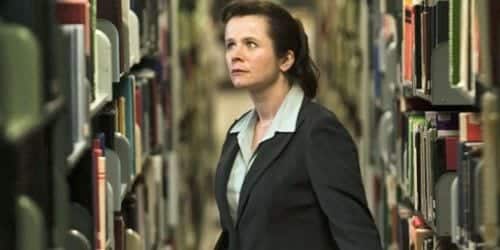
If good intentions were all it took to make a great film, Oranges and Sunshine would be up there in the cinematic pantheon next to Casablanca and Citizen Kane. Unfortunately, despite the historic importance of its subject and excellent performances by Emily Watson, Hugo Weaving, and David Wenham, it feels more like a made-for-television movie than a feature film. Thanks to the miracle of home video, however, you can now watch Oranges and Sunshine in the fitting setting of your television screen.
The story of Oranges and Sunshine centers on an astonishing historical fact: after World War II, over 130,000 British children from “unsuitable” homes were deported to Australia, without their parents’ permission, ostensibly to enjoy a healthful life full of oranges and sunshine and, presumably, good moral character. Instead, most were raised in group homes where they were sexually abused, deprived of education, and forced into hard labor. Many of the deported children were told their parents were dead, while many parents were told their children had been adopted; given the distances involved and the difficulties of communication and travel at the time, all parties had little choice but to accept what they were told and do the best they could under the circumstances.
This episode of history remained largely unknown until a British social worker named Margaret Humphreys (played by Emily Watson) was approached, in 1986, by a woman asking for help in tracing her parents. At first Humphreys does not believe the woman’s story of hundreds of unaccompanied children being put on a boat to Australia, but after hearing a second, similar story, she decides to investigate. Her investigation rapidly becomes a crusade, with the support of her husband (Richard Dillane), and she makes it her mission not only to unite as many of the surviving children as possible with their remaining relatives, but also to uncover the truth about who was responsible and how so massive an operation could have been carried out with so little public oversight.
The reality of this story, as related in Humphrey’s book Empty Cradles, is absolutely heart-wrenching. It’s odd, therefore, that Oranges and Sunshine feels so perfunctory and distanced, as if director Jim Loach and screenwriter Rona Munro were afraid that the audience couldn’t handle the full horror of the story were it developed in any sort of a dramatic fashion. The pace feels all wrong as well: we are rushed from one event to the next, as if the dramatic structure were composed of evenly-spaced dominoes to be knocked over in rapid, regular succession. Even the pleasure of seeing Humphreys unravel the mystery of the deportations is largely denied us—instead, we are presented with a series of scenes, each of which contains one vital piece of information, and which lead in a direct and linear fashion to a conclusion, with none of the fumbling and wrong turns and messiness of real life.
It’s not an entirely smooth journey, of course, just one in which the obstacles that appear are easily and predictably overcome. People don’t want to talk to Humphreys, then they do. She has two breakdowns, but quickly recovers. One of the survivors first presents himself as obnoxious and disruptive, but of course he and Humphreys come to an understanding. Humphreys doesn’t want to visit the worst children’s home of them all, Bindoon, then she relents and allows one of the children raised there (David Wenham) to take her there.
I admire the restraint of Oranges and Sunshine, which avoids sensationalizing the events of its story. The problem is that this very restraint soon becomes predictable, to the point where you can predict exactly where the recalled memories will stop, and also where each scene will end, as the story moves relentlessly forward. Denson Baker’s cinematography has a muted tone, as well, as if both Britain and Australia were beset by a dull brown haze obscuring the vitality of everyone and everything.
For all the skill that went in to making Oranges and Sunshine, nothing can compare with the archival footage of the deported children, which brings home the horror of it all: beautiful, happy children treated as if they had no value, as if they were a mere inconvenience to be disposed of as those of higher social station saw fit. It’s a shame the fictional aspects of this film don’t have the same dramatic power.
The DVD of Oranges and Sunshine includes three extras: a making-of featurette (13 min.), interviews with Emily Watson, Hugo Weaving, David Wenham, Jim Loach, and Rona Munro (25 min. total), and the theatrical trailer.

![Call for Papers: All Things Reconsidered [MUSIC] May-August 2024](https://www.popmatters.com/wp-content/uploads/2024/04/all-things-reconsidered-call-music-may-2024-720x380.jpg)



